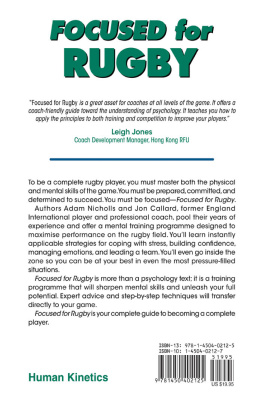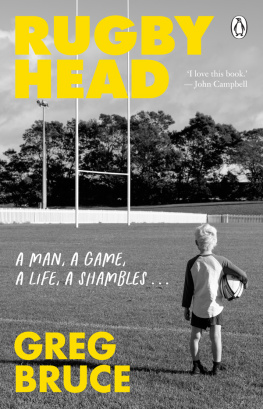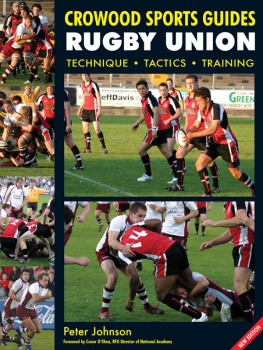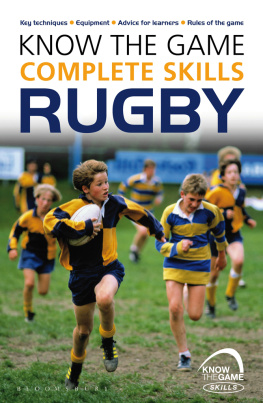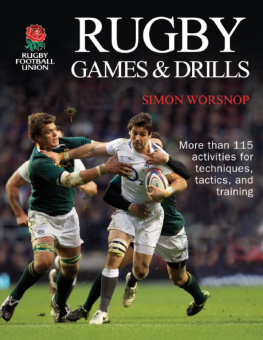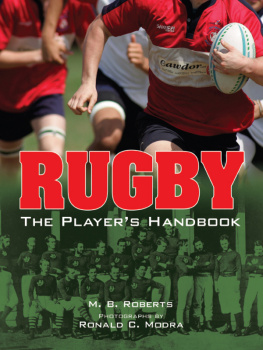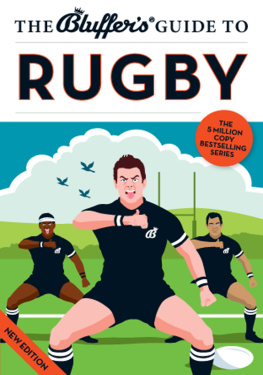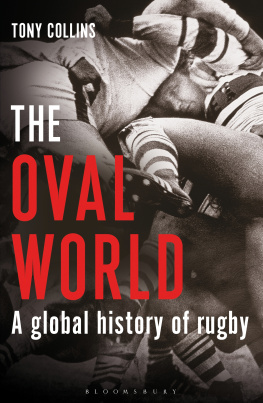

Library of Congress Cataloging-in-Publication Data
Nicholls, Adam R.
Focused for rugby / Adam Nicholls, Jon Callard.
p. cm.
ISBN 978-1-4504-0212-5 (soft cover) -- ISBN 1-4504-0212-7 (soft cover) 1. Rugby football--Psychological aspects. 2. Rugby football--Training. I. Callard, Jon, 1966- II. Title.
GV945.85.P75N54 2012
796.3338--dc23
2011047312
ISBN-10: 1-4504-0212-7 (print)
ISBN-13: 978-1-4504-0212-5 (print)
Copyright 2012 by Adam R. Nicholls and Jon Callard
All rights reserved. Except for use in a review, the reproduction or utilization of this work in any form or by any electronic, mechanical, or other means, now known or hereafter invented, including xerography, photocopying, and recording, and in any information storage and retrieval system, is forbidden without the written permission of the publisher.
Notice: Permission to reproduce the following material is granted to instructors and agencies who have purchased Focused for Rugby: 8, 10, 16, 18, 21, 31, 33, 35, 47, 49, 61, 62, 63, 65, 67, 82, 88, 92, 95, 100, 103, 106, 111, 113, 125, 128, 129, 132, 142, 143, 145, 147, 171, 174, 190. The reproduction of other parts of this book is expressly forbidden by the above copyright notice. Persons or agencies who have not purchased Focused for Rugby may not reproduce any material.
The web addresses cited in this text were current as of December 2011, unless otherwise noted.
Acquisitions Editor: Peter Murphy; Developmental Editor: Anne Hall; Assistant Editor: Tyler Wolpert; Copyeditor: Bob Replinger; Permissions Manager: Martha Gullo; Graphic Designer: Bob Reuther; Graphic Artist: Julie L. Denzer; Cover Designer: Keith Blomberg; Photographer (cover): Peter Muhly/AFP/Getty Images; Photographer (interior): Neil Bernstein, unless otherwise noted; Photo Asset Manager: Laura Fitch; Visual Production Assistant: Joyce Brumfield; Photo Production Manager: Jason Allen; Art Manager: Kelly Hendren; Associate Art Manager: Alan L. Wilborn; Illustrations: Human Kinetics, unless otherwise noted; Printer: United Graphics
Human Kinetics books are available at special discounts for bulk purchase. Special editions or book excerpts can also be created to specification. For details, contact the Special Sales Manager at Human Kinetics.
Printed in the United States of America 10 9 8 7 6 5 4 3 2 1
The paper in this book is certified under a sustainable forestry program.
Human Kinetics
Website: www.HumanKinetics.com
United States: Human Kinetics
P.O. Box 5076
Champaign, IL 61825-5076
800-747-4457
e-mail:
Canada: Human Kinetics
475 Devonshire Road Unit 100
Windsor, ON N8Y 2L5
800-465-7301 (in Canada only)
e-mail:
Europe: Human Kinetics
107 Bradford Road
Stanningley
Leeds LS28 6AT, United Kingdom
+44 (0) 113 255 5665
e-mail:
Australia: Human Kinetics
57A Price Avenue
Lower Mitcham, South Australia 5062
08 8372 0999
e-mail:
New Zealand: Human Kinetics
P.O. Box 80
Torrens Park, South Australia 5062
0800 222 062
e-mail:
E5302
To my parents, George and Christine, thank you
for all the support you have given me over the years.
Adam
To my three lovely daughters, Georgia, Francesca, and Alexa,
who put up with me, and to my wife, Gail, without whose support
I would not be allowed to pursue my dreams in the sport of rugby.
Jon
Contents


I am delighted to have been asked to contribute the foreword for Focused for Rugby. I have known Jon Callard for more than 20 years, both as a player I coached and as a coach I worked alongside. One of Jons great strengths was his goal-kicking ability, a skill in which players stand alone in the big arena with all the attendant pressures that it can bring. Performing this technique successfully at all levels requires real mental clarity.
Focused for Rugby is an interactive book for both players and coaches, whatever their age and experience. This book also sets out all the information simply and explains why the mental side of the game is so important. I have to put my hand on my heart and say that I am not a massive fan of the term sport psychology, but I am a fervent believer in the importance of developing the mental skills that enable players to focus solely on the task at hand whilst actions and thoughts fight to interfere with successful execution of the job. Rugby has changed dramatically over the last 20 years, but I suspect that for the majority of coaches and players, the mental side of the gamethe glue that holds together the technical, physical, and tactical sides of the game under the most hostile pressureis the least understood and practised, which is why Focused for Rugby is very much needed!
Many coaches and players equate mental toughness with physical toughness. Nothing could be further from the truth. We have all witnessed the macho player doing the most ridiculously off-task things in the heat of battle, to the detriment of his companions and the outcome of a game. The mental side of the game demands as much regular practice as all the other elements of high-level performance. It requires much more than just dabbling now and again. The skill involves honing a mindset of great clarity under intense scrutiny to enable consistent success and not in a haphazard fashion. This skill is emphasised in Focused for Rugby as you are encouraged to practice psychological skills and monitor your own progress.
In my mind, I am perfectly clear about one thing. A coach and a group of players who use the techniques that you will read about in Focused for Rugby will be on the road to success in the sport.
Enjoy reading Focused for Rugby, and enjoy the success! Good luck.
Brian Ashton, MBE
The purpose of this introduction is to explain what sport psychology is, discuss the myths surrounding it, the potential benefits of sport psychology in rugby, and how to use this book effectively.
Psychology is concerned with the mind and the reasons why people think and act the way that they do. Sport psychology is concerned with the way that athletes think and behave whilst playing sport. The two primary goals of sport psychology are to (a) ensure the well-being of athletes whilst playing sport and (b) enhance their performance.
Many athletes, coaches, and sport commentators seem to misunderstand sport psychology, which often gives this discipline a negative reputation. This stigma is partly fueled by unqualified individuals who practise as sport psychologists and give the players whom they work with false expectations. Seeing a sport psychologist is not like having a magic wand waved in front of you. Sport psychologists dont have any special powers! Reading this book will not transform you or your performance within seconds. This book offers techniques that, when practiced, will enable you to fulfil your potential during training and matches, in addition to enhancing your emotional well-being.
Next page
